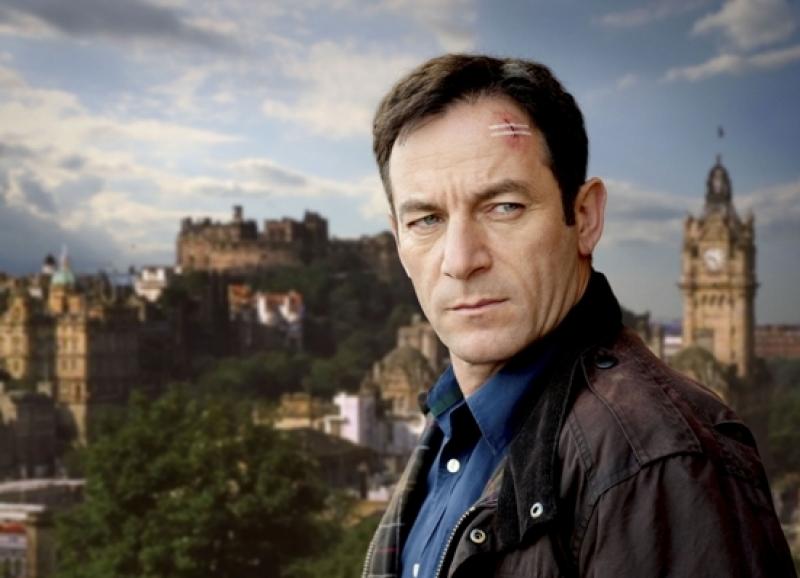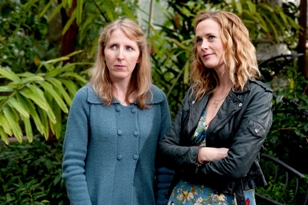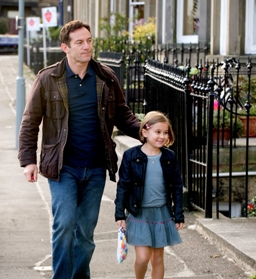Case Histories, BBC One | reviews, news & interviews
Case Histories, BBC One
Case Histories, BBC One
Kate Atkinson's likeable private eye solves crime quirkily in Edinburgh

Thanks to her evergreen bestseller Behind the Scenes at the Museum, Kate Atkinson can call on an army of fans to buy her work whenever it appears in print. Its debut on screen is, perhaps, another matter. Will they buy the BBC’s rendition of Case Histories? Those who have not had the pleasure of reading it are less advantageously placed to grumble about hideous revisions, outrageous changes and all manner of infidelities.
Welcome to the BBC casting department's version of Edinburgh. At least the city played its part to the hilt. “Non le ciel n’est pas sodding bleu,” private detective Jackson Brodie advised the nice woman on the Teach Yourself French CD in his car. In the first of three two-part cases, Auld Reekie’s gloomy brickwork brooded darkly as Brodie pursued any number of loose ends and one lost cat.
Case Histories provides Jason Isaacs with a part that feels like a very snug fit. As Jackson Brodie - or Mr Brodie to his clients, in a drama that keeps faith with old-fashioned formalities - he is part hunk, part mess, all sleuth. A regular set of contradictions, he jogs and he smokes, he smiles and he scowls. Wife long gone, along with the police job, he has limited access to his daughter and the case files of mysteries he’s hired to solve. It’s not quite clear which frustrates him more. “You’re so desperate to belong,” Brodie’s old colleague (Amanda Abbington) told him, “but there’s something in your character that will never let you do that.” It’s good to have these things heavily signposted. A fiver says that something's to do with the haunting memories of a drowned sister, whom we saw being climactically fished out of a canal.
 To crowbar three books into six hour-long episodes, there are times when it all feels that atmospherics and the finer brushstrokes have been sacrificed to the crude requirements of exposition. Brodie inherited his first case when, hired to look for an old bat’s cat, he heard screams in the neighbouring garden. “Everything OK?” he said, poking his head over the wall, and within two lines of dialogue he was on a new case. A diehard Atkinson fan may well, no doubt, write in to explain that’s exactly how it happened in the book; I’ve a hunch it was subtler.
To crowbar three books into six hour-long episodes, there are times when it all feels that atmospherics and the finer brushstrokes have been sacrificed to the crude requirements of exposition. Brodie inherited his first case when, hired to look for an old bat’s cat, he heard screams in the neighbouring garden. “Everything OK?” he said, poking his head over the wall, and within two lines of dialogue he was on a new case. A diehard Atkinson fan may well, no doubt, write in to explain that’s exactly how it happened in the book; I’ve a hunch it was subtler.
As adapted by Ashley Pharaoh, Atkinson’s world view seems to encompass an ambivalent attitude to murder and other perversions. Yes, it was brutal and horrid to see a young woman have her throat slashed, blood spurting wiggly lines on the wall of her father’s law firm, thus sending Brodie on the hunt for a killer the police can’t track down. But the ghastliness has its frothy side too. Brodie has also been asked to investigate the long-unsolved disappearance of a little girl by her two posh sisters. Played for comedy by Natasha Little and Fenella Woolgar (pictured above), it was hard to buy into their anguish. Little’s character is flirting with Brodie without let-up, though not as successfully as a more pragmatic vamp who humped him simply so he would take on another missing person’s case.
Case Histories is dripping with character actors doing their thing (none more than Phil Davis as the bereaved lawyer who can’t believe his murdered daughter might actually have had a sex life). But Isaacs’ most watchable co-star is Millie Innes (pictured below left with Isaacs) as his precocious eight-year-old Marlee, who has a knowing attitude to gore and, happily accompanying her father as some kind of junior sidekick, sticks just the right side of intolerably cute. (Another reason to high-five her performance: she's actually Scottish.)
 Brodie also has excellent taste in mournful music: it was a deep pleasure to hear him spin Nanci Griffith’s version of John Prine’s “Speed of the Sound of Loneliness”. “Why do we always have to listen to sad music?” wondered Marlee. I guess because we need to have these things spelled out.
Brodie also has excellent taste in mournful music: it was a deep pleasure to hear him spin Nanci Griffith’s version of John Prine’s “Speed of the Sound of Loneliness”. “Why do we always have to listen to sad music?” wondered Marlee. I guess because we need to have these things spelled out.
But Case Histories will live or die on Isaacs’ immensely likeable performance. Trouble is, enough people have to like him being liked by a lot of female characters (he doesn't talk to men much). Look what happened to Rufus Sewell and Zen, the much-admired outing for Michael Dibdin's suave detective which BBC Drama ruthlessly culled and dumped like a victim in a murder mystery.
Add comment
The future of Arts Journalism
You can stop theartsdesk.com closing!
We urgently need financing to survive. Our fundraising drive has thus far raised £33,000 but we need to reach £100,000 or we will be forced to close. Please contribute here: https://gofund.me/c3f6033d
And if you can forward this information to anyone who might assist, we’d be grateful.

Subscribe to theartsdesk.com
Thank you for continuing to read our work on theartsdesk.com. For unlimited access to every article in its entirety, including our archive of more than 15,000 pieces, we're asking for £5 per month or £40 per year. We feel it's a very good deal, and hope you do too.
To take a subscription now simply click here.
And if you're looking for that extra gift for a friend or family member, why not treat them to a theartsdesk.com gift subscription?
more TV
 The Potato Lab, Netflix review - a K-drama with heart and wit
Love among Korean potato-researchers is surprisingly funny and ideal for Janeites
The Potato Lab, Netflix review - a K-drama with heart and wit
Love among Korean potato-researchers is surprisingly funny and ideal for Janeites
 Adolescence, Netflix review - Stephen Graham battles the phantom menace of the internet
How antisocial networks lead to real-life tragedy
Adolescence, Netflix review - Stephen Graham battles the phantom menace of the internet
How antisocial networks lead to real-life tragedy
 Drive to Survive, Season 7, Netflix review - speed, scandal and skulduggery in the pitlane
The F1 documentary series is back on the pace
Drive to Survive, Season 7, Netflix review - speed, scandal and skulduggery in the pitlane
The F1 documentary series is back on the pace
 A Cruel Love: The Ruth Ellis Story, ITV1 review - powerful dramatisation of the 1955 case that shocked the public
Lucy Boynton excels as the last woman to be executed in Britain
A Cruel Love: The Ruth Ellis Story, ITV1 review - powerful dramatisation of the 1955 case that shocked the public
Lucy Boynton excels as the last woman to be executed in Britain
 Towards Zero, BBC One review - more entertaining parlour game than crime thriller
The latest Agatha Christie adaptation is well cast and lavishly done but a tad too sedate
Towards Zero, BBC One review - more entertaining parlour game than crime thriller
The latest Agatha Christie adaptation is well cast and lavishly done but a tad too sedate
 Bergerac, U&Drama review - the Jersey 'tec is born again after 34 years
Damien Molony boldly follows in the hallowed footsteps of John Nettles
Bergerac, U&Drama review - the Jersey 'tec is born again after 34 years
Damien Molony boldly follows in the hallowed footsteps of John Nettles
 A Thousand Blows, Disney+ review - Peaky Blinders comes to Ripper Street?
The prolific Steven Knight takes us back to a squalid Victorian London
A Thousand Blows, Disney+ review - Peaky Blinders comes to Ripper Street?
The prolific Steven Knight takes us back to a squalid Victorian London
 Zero Day, Netflix review - can ex-President Robert De Niro save the Land of the Free?
Panic and paranoia run amok as cyber-hackers wreak havoc
Zero Day, Netflix review - can ex-President Robert De Niro save the Land of the Free?
Panic and paranoia run amok as cyber-hackers wreak havoc
 The White Lotus, Series 3, Sky Atlantic review - hit formula with few surprises but a new bewitching soundtrack
Thailand hosts the latest bout of Mike White's satirical takedown of the rich and privileged
The White Lotus, Series 3, Sky Atlantic review - hit formula with few surprises but a new bewitching soundtrack
Thailand hosts the latest bout of Mike White's satirical takedown of the rich and privileged
 Hacks, Season 3, NOW review - acerbic showbiz comedy keeps up the good work
Jean Smart's portrayal of Deborah Vance is an all-time classic
Hacks, Season 3, NOW review - acerbic showbiz comedy keeps up the good work
Jean Smart's portrayal of Deborah Vance is an all-time classic
 Surviving Black Hawk Down, Netflix review - the real story behind Ridley Scott's Oscar-winner
Documentary series looks at the 1993 'Battle of Mogadishu' from both sides
Surviving Black Hawk Down, Netflix review - the real story behind Ridley Scott's Oscar-winner
Documentary series looks at the 1993 'Battle of Mogadishu' from both sides
 Vietnam: The War That Changed America, Apple TV+ review - painful and poignant stories from a terrible conflict
Fifty years later, the wounds still haven't healed
Vietnam: The War That Changed America, Apple TV+ review - painful and poignant stories from a terrible conflict
Fifty years later, the wounds still haven't healed

Comments
...
...
...
...
...
...
...
...
...
...
...
...
...
...
...
...
...
Thanks very much! just what
Wonderful! I have been
...
...
Horrible soundtrack detracts
The soundtrack for the Case
Over here in the US, we get
What a beautiful soundtrack
getting back to the original